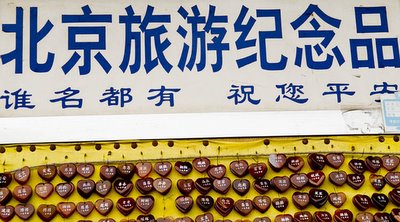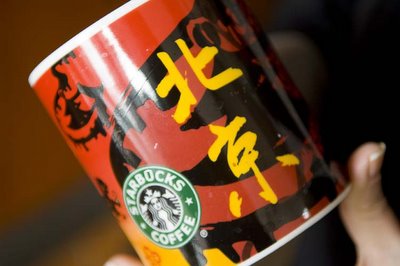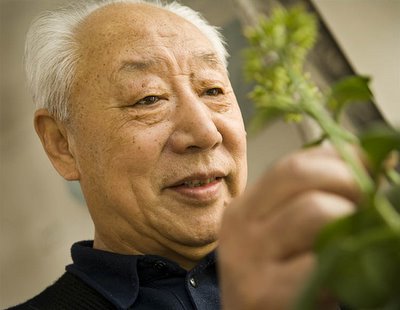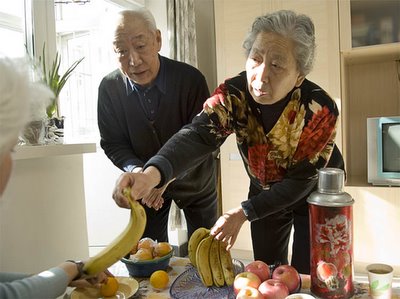There are over 6,000 characters in the Chinese language. After three trips to China, I recognize about half a dozen. Here’s a couple of very useful ones.
This is the character for North (Bei):

It reminds me of a mirror image of a lower case ‘t’.
This is the character for Capital (Jing):

To me this looks like a child’s drawing of a one-legged man wearing a hat.
 Put them together and you spell Bei-jing.
Put them together and you spell Bei-jing.The Northern Capital of China

Can you tell where this taxi is by looking at the Chinese characters?


The written Chinese language is beautiful and many consider it art and hang it on their wall or as in the case of our son Jeff, tattoo it on their backsides. While the symbols for Beijing are some of the few that I recognize, neither is my favorite Chinese character. For that, read on.

I met my favorite Chinese character in a tiny 4th-floor walk up apartment in central Beijing. Chris and I were there on assignment to take his picture. It would be used to illustrate active Asian seniors using our client’s health care products. Neither he nor his wife of 56 years spoke a word of English but it was clear they were a happy couple, enjoying retirement. We set up a series of lifestyle scenes showing them cheerfully cooking and gardening before wrapping up the shoot. When we had our equipment cases all repacked and ready to go, we were offered tea and fruit. Although our schedule was extremely tight, I knew it would be extremely impolite of us to refuse.

We all crowded onto the tiny sofa as the wife peeled tangerines and bananas. When I admired a family picture hanging on the wall, he produced an old album of black and white photos and shyly offered it to me.
I held in my hands the illustrated story of his entire life. Flipping through the crumbling pages, I saw him first in his elementary school uniform, then in a stiff formal ‘professional’ shot of him with his whole family dated sometime around 1920, and some adorable candid shots with him and his young blushing bride. She was looking over my shoulder and would alternately sigh or giggle at the turning of a page. She blushed anew at whatever sweet remark he made when her picture as a girl was seen.
Next there was a whole series of shots of him in a military uniform. In some he was obviously trying to look macho, but in most he was having fun, being goofy for the camera with his Army buddies. It made me think of the photos my son Dan has shown me of him and his Army pals. Just guys being guys, it's the same all over the world.
When I asked about it, our interpreter told us that our gracious host had been a captain in The Army of The People’s Republic of China. That’s Chairman Mao’s Army. He had fought against Chiang Kai-shek. I was having tea with an honest-to-god card-carrying Little Red Book reading Red Army Communist. Wow. I was shocked. This was the sweetest little old man you would ever want to meet. How could I, and the rest of the western world, have so hated and feared the likes of him?

They asked us to stay for lunch which sounded great. They were preparing homemade steamed dumplings. What a great chance to learn about and taste authentic Chinese food. But no, we had several more locations to shoot that day. I hated to leave. I wanted to hear more about what it was like back in the late 40s when Mao Tse-Tung came to power or during the 50s when nearly all of China was starving or during the Cultural Revolution of the mid 60s or what he thought about the student protests in Tiananmen Square in the 80s. There was so much he could have told me and so much I wanted to hear from someone who had really been there and done that.
I can’t stop thinking about him. I hate that part of my job – I get just a tantalizing glimpse of people’s lives and then must hurry off. Which is what I must do now!
 More later down The Silk Road,
More later down The Silk Road,Suzanne